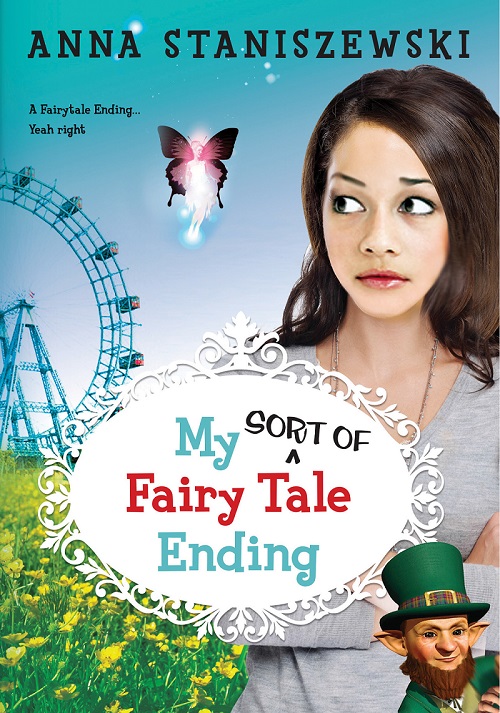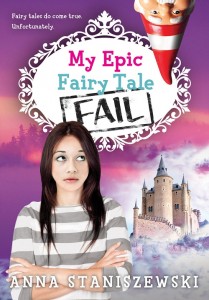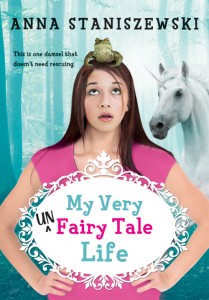Anna Staniszewski, author of the hilarious My Very UnFairy Tale Life series, the most recent of which, called My Sort of Fairy Tale Ending, releases next month, discusses writing middle grade fiction. A topic she is well-versed in. Welcome, Anna!
 How to Write Middle Grade Fiction in Two Simple Steps
How to Write Middle Grade Fiction in Two Simple Steps
What’s the hardest thing about writing middle grade fiction? Being an adult. Really. Your adult self likes to get in the way when you’re writing for 8-12 year olds. Your adult self is judgmental and bossy. It thinks it knows best. Sometimes it won’t shut up.
Here’s my advice when you’re writing middle grade fiction: Try to quiet the adult part of your brain as much as you can and consider these two questions.
1. How can I be the child protagonist?
2. How can I let the child protagonist be him/herself?
Let’s tackle the first question. How can I be the child protagonist? You can’t, right? Because you’re an adult. Well, I’m not sure that’s true. For one, I think many of us have inner children that we can tap into. (And some of us never quite mature beyond the age of thirteen, anyway.)
I’ve found that middle grade books that don’t quite work feel like they were written by an adult instead of told by a child character. To avoid this trap, try to tap into those feelings of what it was like to be the age you’re writing about. Do some journaling as your younger self, if that helps.
Also, do your research. Try to find a (non-creepy) way to spend time with kids and listen to what they talk about, care about, etc. Trust me. This will help. And remember that you’re not writing about all children; you’re writing about one particular character who happens to be in elementary school or—even worse—middle school.
And now on to the second question. How can you let the child protagonist be herself? For one, you need to spend a lot of time working out this specific character, what she wants, what she needs, etc. But also, try to quiet that adult voice that might be tempted to judge your character’s actions or to medicate her or to call her mother.
Because here’s the thing: Your young character might be smart and resourceful, but chances are she has less world experience than you do. She’s going to make mistakes. Maybe big mistakes. Let her. And don’t worry about what kind of example she’s going to set for other kids. If you try to make an example of her, she’ll feel fake. Let her mess up and learn and BE HUMAN. Then she’ll feel real.
So that’s it. How to write middle grade fiction in two simple steps. Easy, right? Not exactly. But when it all comes together, it really is worth it. Trust me. I’m an adult.
My Sort of Fairy Tale Ending blurb:
Happily ever after? Yeah, right. Jenny’s search for her parents leads her to Fairy Land, a rundown amusement park filled with creepily happy fairies and disgruntled leprechauns. Despite the fairies’ kindness, she knows they are keeping her parents from her. If only they would stop being so happy all the time-it’s starting to weird her out! With the help of a fairy-boy and some rebellious leprechauns, Jenny finds a way to rescue her parents, but at the expense of putting all magical worlds in danger. Now Jenny must decide how far she is willing to go to put her family back together.
Born in Poland and raised in the United States, Anna Staniszewski grew up loving stories in both Polish and English. She was named the 2006-2007 Writer-in-Residence at the Boston Public Library and a winner of the 2009 PEN New England Susan P. Bloom Discovery Award. Currently, Anna lives outside of Boston with her husband and their black Labrador, Emma.
When she’s not writing, Anna spends her time teaching, reading, and challenging unicorns to games of hopscotch. She is the author of My Very UnFairy Tale Life and its sequels, My Epic Fairy Tale Fail and My Sort Of Fairy Tale Ending, all published by Sourcebooks Jabberwocky. Look for the first book in Anna’s next tween series, The Dirt Diary, in January 2014, and visit her at www.annastan.com.























